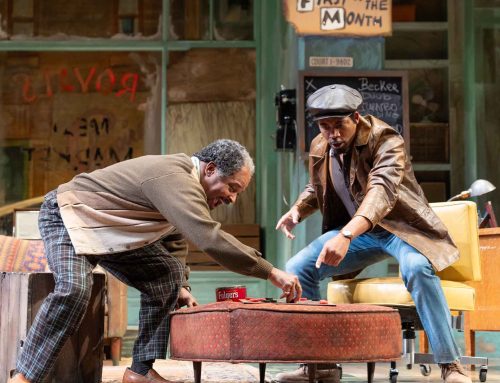at the Oregon Shakespeare Festival
 Intimate Apparel by Lynn Nottage
Intimate Apparel by Lynn Nottage
I got teary-eyed watching Esther Mills and Mr. Marks appreciate the swath of fine fabric, Yes, their unrolling of a piece of cloth was that emotional, complex, and full.
I didn’t feel manipulated. There were no “Love means never having to say you’re sorry” sniffling heart-string tugs. It was just that what wasn’t being said on stage — what couldn’t be said on stage — was just that potent.
Intimate Apparel’s surface story is easy to tell. The play is about a mid-30’s single Negro seamstress of women’s undergarments in the early 1900’s. People talk to her intimately because of the nature of her work. At the beginning of the play Esther has never had a love relationship. During the play we follow her as she falls in love and gets married. It’s a simple story.
Ah,… but the story is so well done. Author Lynn Nottage gives us good glimpses into the lives touched by our heroine, Esther (played spectacularly by Gwendolyn Mulamba). Her clients are stereotypes of diversity — an uptown socialite and a chorus girl prostitute — but there is no cardboard cutout in their portrayal. Esther’s yearnings that lead her to falling in love with a man she knows only from his letters are somehow realistic: both her idealism and practicality ring true.
 The pent-up interaction between Esther and Mr. Marks (Gregory Linnington), the Orthodox Jew who supplies her with fabric, is simply heartbreaking. Mr. Marks, also single and also too old to be never married, is clearly the lover the audience would choose for Esther. Of course, race and class keep that relationship from happening, even though their mutual admiration of fabric and their understanding of each other is impossible to watch with detachment.
The pent-up interaction between Esther and Mr. Marks (Gregory Linnington), the Orthodox Jew who supplies her with fabric, is simply heartbreaking. Mr. Marks, also single and also too old to be never married, is clearly the lover the audience would choose for Esther. Of course, race and class keep that relationship from happening, even though their mutual admiration of fabric and their understanding of each other is impossible to watch with detachment.
Intimate Apparel is reportedly the hot show sweeping the country this year. The play itself probably deserves it, but it’s difficult to conceive a better production than the one mounted by the Oregon Shakespeare Festival. Three of the four OSF newcomers give depth and perfect nuance to their roles. The emotions crossing Mulamba’s face transform the mood of the entire stage within a second. She brings you along on her internal ride, and there’s no chance of your falling off and un-suspending your disbelief. Wonderful.
Erik LaRay Harvey as Esther’s eventual husband George Armstrong is perfect with enough physical beefiness to make you think he could be a laborer on the Panama Canal as claimed in the script. At the same time, Harvey blends fluid movement, a Caribbean lilt, and practiced winning smile into a too-real “men are pigs” persona.
The chorus girl whore, Mayme, is written without a heart of gold. Played by Tiffany Adams, this character is a real imperfect woman who is a full participant in the world. Not a stand-in for some moral point or other, Mayme genuinely lives.
The final OSF rookie, Perri Gaffney, as the landlady and queen of Esther’s bordering house, is only okay. Mostly she’s a fun foil who lends perspective and provides unwanted foreshadowing. However, the character has a lot of dialog and in the middle of some of her paragraph speeches Gaffney was too quick and flat, rushing to get through. It was only occasionally and only a bit distracting, but it resulted in the weakest performance of the ensemble.
The two OSF veterans, the plays only two white characters, did superbly.
Gregory Linnington’s Mr. Marks, like Esther, represses his emotions until they squeeze out of your pores. No shtick. Just breathtaking.
Finally, Terri McMahon’s socialite role was delivered with caution and care. McMahon came across sometimes as a tart, sometimes as a wounded lover. But, she was always deliberate and on target.
The set was complex but comfortable. There are many scenes and rooms, but the switches among the venues were quick and smooth. The over stage that gave us letters from the Panama Canal was especially well done.
The Scott Joplin-esque music and the crucial, but unobtrusive costumes also merit special praise. They added a lot; they were critical. Yet, they refrained from overpowering the storyline.
The playbill notes claim that Intimate Apparel, like other of Nottage’s works, tells the “rich, complicated, funny, and essential” stories from her Afro-American heritage. The play also is on the calendar as OSF’s annual “black play”, and therefore earns the status of being somehow socially good. I find these cultural notes annoying and limiting. Did Shakespeare’s playbills talk about how his plays came from Stratford perspective on English life? Intimate Apparel is good enough to justify the question.
![]()





Leave A Comment